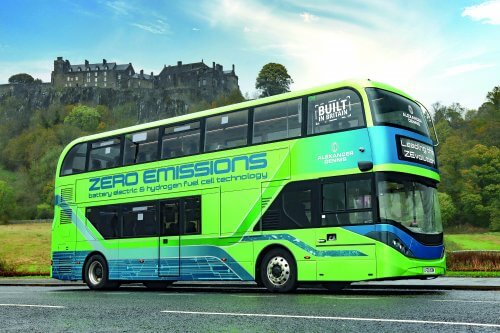Nine operators are set to benefit from the latest funding to support 276 new battery-electric buses and associated infrastructure
The Scottish Government has awarded over £62 million through the first phase of its Zero Emission Bus Challenge Fund (ScotZEB), the largest investment to date in Scotland to decarbonise buses. It will support operators in replacing 276 diesel buses with new battery-electric vehicles as well as to fund the installation of the required charging infrastructure. Alexander Dennis (ADL) will build 137 of the buses at its plant in Falkirk, supporting green manufacturing jobs in Scotland.
Scottish Minister for Transport Jenny Gilruth said: “We want more people to choose to travel by bus now and in the future and to do so, knowing that local buses are contributing to our climate change ambitions. Our Zero Emission Bus Challenge Fund is successfully decarbonising Scotland’s bus fleet faster than ever before and making a significant contribution to our Mission Zero ambition for Transport.
“We’re providing £62 million in a way which attracts additional private sector investment, resulting in 276 new zero-emission buses to be deployed across Scotland. 137 of these buses will be built in Falkirk – supporting skilled, green manufacturing jobs and benefiting the Scottish economy.
“Supporting a just transition to a net zero economy is central to the ScotZEB approach. Through this round we’re supporting smaller bus operators and rural service providers, which I’m pleased are equally keen to step up and help tackle the climate emergency. I’m pleased that with this significant award for greener buses, free bus travel for under 22s and the provision of over half a billion pounds in long term funding for bus priority infrastructure, we’re putting buses at the heart of Scotland’s green recovery and helping people to choose to travel more sustainably.”
William Houston, Owner of Houston’s Coaches in Lockerbie commented: “Here at Houston’s we want to do our part to respond to the climate emergency and move to a zero-emission fleet. As a smaller local operator, it’s been difficult for us to compete with larger operators and attract in financial support to help make the switch.
“The ScotZEB programme has helped us compete and enabled Houston’s to invest in new zero-emission buses. I’m delighted that our customers will soon benefit from the modern conveniences of four new battery-electric buses, which at the same time will improve air quality and help protect our environment.”
Duncan Hearsum, Chief Executive of the Order of Malta Dial-a-Journey in Stirling said: “We’re pleased to be hosting an EV Charging Station for Stirling Council at our premises which has been funded through ScotZEB, offering fast and easy access to the Springkerse park & ride facility. As the leading community transport operator operating across the Forth Valley, we want to take climate action and transition to a zero-emission fleet. Sharing an EV charging facility on our site will be a cost effective way for us to start the shift to electric and will help us accurately evaluate our infrastructure needs.”
ScotZEB follows two rounds of funding under the predecessor Scottish Ultra-Low Emission Bus Scheme in September 2020 and March 2021 and aims to support ‘swift, and significant, change’ in the bus market in favour of zero-emission technologies as part of the Scottish Government’s objective of creating sustainable and inclusive growth. The fund is part of efforts to help achieve targets to reduce greenhouse gas emissions, contribute to the delivery of low emission zones and encourage inward investment and growth in the supply chain of zero carbon vehicle and energy solutions in Scotland, with associated employment, economic and social benefits.
In submitting bids, bidders were encouraged to put in place arrangements with partners or collaborators to minimise the level of subsidy requested, such as collaborations across multiple bus operators to get the financial benefits of scale; collaborations with non-bus vehicle operators or local authorities to get the benefits of scaled-up demand for hydrogen; partnerships between energy companies, operators and financiers to use the charging infrastructure to generate new revenue streams, or; partnerships between financiers and manufacturers to purchase buses for leasing to operators.
New vehicles will range in size from minibuses to double-deckers, with nine operators and local authorities benefiting. First and the collective bids from Stagecoach secured the largest funding amounts, whilst funding for 26 vehicles signals the start of significant expansion for Edinburgh-Dundee electric coach operator Ember.
ScotZEB phase one awards
- First Aberdeen and First Glasgow, £18,599,858, 74 Buses
- McGill’s, £9,086,933, 41 Buses
- Stagecoach (Western Buses), £8,029,890, 39 Buses
- Stagecoach (Fife Scottish Omnibuses), £7,329,923, 32 Buses
- Ember Core, £5,562,126, 26 Buses
- Stagecoach (Highland Country Buses), £5,834,978, 25 Buses
- Stagecoach (Bluebird Buses), £3,066,547, 13 Buses
- Craig of Cambeltown, £2,409,294, 10 Buses
- Shuttle Buses, £485,955, 5 Buses
- Dumfries and Galloway Council, £633,934, 4 Buses
- Houston Coaches, £368,413, 4 Buses
- Stirling Council, £595,404, 3 Buses


